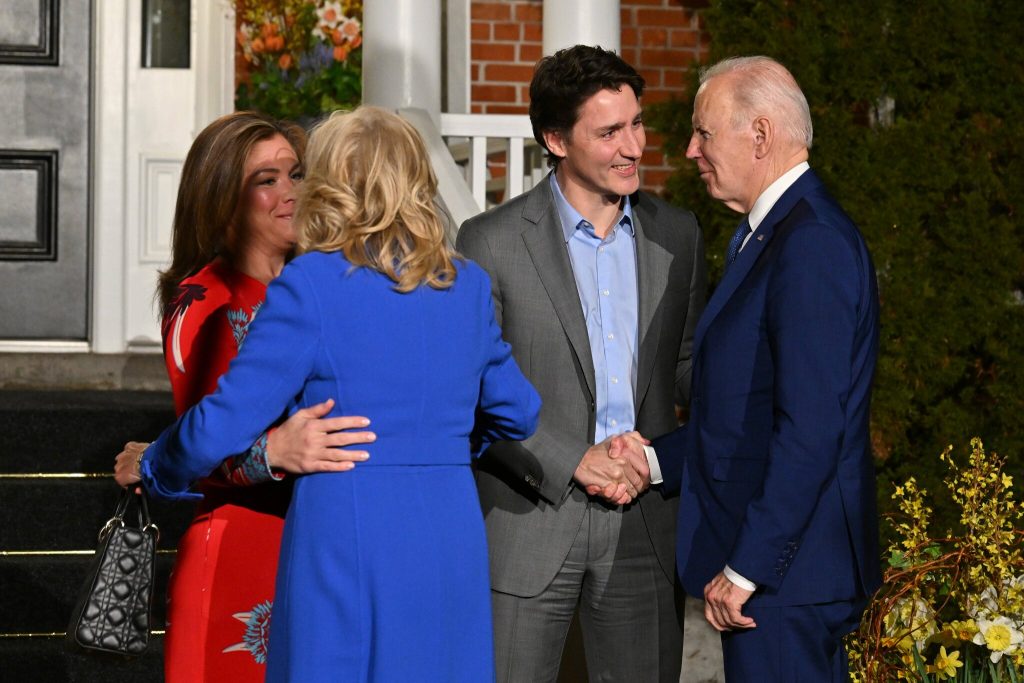
WASHINGTON – President Joe Biden has a loaded schedule for his first trip to Canada as president: a gathering at the prime minister’s residence, a gala and plenty of opportunities to display his chummy relationship with Canadian Prime Minister Trudeau.
Amid the rosy display of the two nation’s relationship, however, the two leaders will also find themselves addressing key global and hemispheric issues, including the Russia-Ukraine war, increased security concerns with China and a spike in migration at the United States’ northern border.
The latest
- What else is on the schedule: Biden and Trudeau will hold a bilateral meeting and a news conference. Biden will also address Canada’s Parliament and later attend a gala dinner with first lady Jill Biden at the Canadian Aviation and Space Museum.
- Loaded agenda: National Security Council spokesman John Kirby said Wednesday that the two leaders will discuss defense spending, clean energy and climate change, how Canada can assist in Haiti and Ukraine, and migration throughout North America.
- Biden’s arrival: Biden arrived in Canada Thursday evening and was greeted at Ottawa International Airport by Mary Simon, governor general of Canada, and her husband, Whit Fraser.
Increase defense spending to address Russia, Ukraine and China
Chinese President Xi Jinping has displayed his support for Russian President Vladimir Putin in his war against Ukraine, and the Pentagon has suspected that a balloon shot down last month after crossing the U.S. was sent by China to spy on the United States, all while North Korea continues to test its nuclear capabilities.
The United States wants Canada to do more to help on some of these global issues.
Biden and Trudeau are expected to discuss defense spending, including the North Atlantic Treaty Organization (NATO) and the North American Aerospace Defense Command (NORAD).
“The President will underscore how the U.S.-Canada partnership benefits not only our two countries but the entire world, and that by working together, we can address some of the biggest challenges we face,” Kirby said Wednesday.
The pressure is on for Canada.
Vincent Rigby, former national security and intelligence adviser to the prime minister of Canada, said Biden has turned to key allies such as the U.K., Japan and Australian to increase their defense spending or to assist with defense equipment. Rigby said Canada hasn’t been keeping up with some of those allies.
“President Biden may be looking to have the Prime Minister assure him, or reassure him, that hey, Canada has its eye on the ball,” Rigby said, adding that Canada is prepared to step up at home and in North America.
He said the United States often comes to Canada to say that it’s not doing enough on defense or national security and that it’s “a perennial issue in their relationship.”
But he added that there’s an expectation this time that Canada will “hopefully do a little bit more.”
Immigration problems at the U.S. northern border
Migration challenges are hitting the border – the northern border, that is.
There has been a spike in recent months of migrants crossing between Canada and the United States without authorization along the border near New York, Vermont and New Hampshire. The increased number of migrants has caused challenges for local officials in those states and in Canada.
Kirby said “without question” the two leaders will be discussing migration.
A key treaty expected to come up in their immigration talks: the Canada-United States Safe Third Country Agreement.
- The agreement says that a person must seek refugee status in the first country they arrive in between either the U.S. or Canada unless they qualify for an exception.
- Kirby would not say whether the two leaders would make changes or scrap the treaty because of a loophole that has led to a spike in migrants crossing into Canada.
But the two countries may have struck a deal to address some immigration challenges on the northern border.
The Los Angeles Times is reporting that the United States and Canada have agreed to allow each country to turn back asylum seekers who come to the northern border without authorization.
Help on Haiti
Haiti will probably also be on the top of the agenda for the two leaders.
As armed gangs have taken over Haiti, causing instability, the United States wants Canada to send a peacekeeping force to the country. But Trudeau has expressed reservations over sending peacekeepers or military personnel to help the Haitian police forces.
Kirby said the two leaders will discuss the unrest in Haiti, but he declined to answer whether Biden will press Trudeau to send peacekeepers. Kirby added that if there is a need for a peacekeeping force, it will “have to be worked out directly with the Haitian government and with the U.N.”
“They share a concern about the dire situation down there from a security and humanitarian perspective,” Kirby said. “This is not something that is unfamiliar to either the prime minister or the president.”